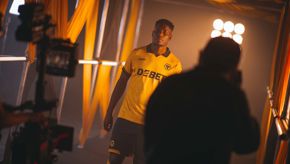WATCH
LISTEN
READ
Johnny Phillips: Laura, you’ve worked in a number of roles at Wolves, including time at Wolves Foundation, but can you explain what your remit is now?
Laura Nicholls: Yeah, essentially, myself and Jon Hunter-Barrett, we split the head of Academy role, so the traditional role is split across two people, which gives me the opportunity to really focus on education and player care and the support mechanisms that we have around the players that’s off the pitch. I also look after all of our administration and operations functions, so a big remit that allows me and Jon to lead the department together.
JP: It seems to be a really exciting period for Wolves Women, so let’s start with a few questions we’ve had about them. Do you plan to keep using Old Wulfrunians? How suitable are those facilities?
LN: It’s a really interesting question. Obviously, at the moment, we’re in kind of limbo, because we don’t know what league the women’s team are going to be playing in next season. If we move into the Championship, then there are lots of ground regulations that perhaps, at the moment, as it currently stands, the Old Wulfs stadium doesn’t meet, but we’re working really closely with them; they’ve been a fantastic partner for us this season. We’re exploring lots of options; I don’t want to commit to exactly where we’re going to be next season because we don’t know what league we’re going to play in, but, certainly, we’re really proud of the relationship we’ve had with Old Wulfs this season.
JP: And a follow-up question to that is would there be a time when you’d consider an Academy stadium, a sort of self-contained area like that?
LN: I think that it’s definitely something we should consider as both the Academy and the women’s teams’ progress. Obviously, trying to create something that is bespoke to Wolves, gives us a real good home, gives us the opportunity to develop and attract players and retain players. I think it’s definitely something that we’d want to consider in the future. I think Compton Park, as it is at the moment, doesn’t really lend itself to creating that here and Wolverhampton is quite a densely populated city, so there’s lots of challenges with that, but I think it’s something that we’d definitely want to consider for the future.
JP: So there’d be quite a few infrastructure changes if Wolves did continue progressing all the way up to the WSL, for example?
LN: Yeah, so obviously we’ve made lots of progression with the integration of the Academy and I think one of the things that we wanted to be really clear on was that we didn’t want to create a separate women’s team. We wanted to have full integration with the Academy, utilise the resources, utilise the best practice that works for the boys, identify which bits can work for the girls and vice versa and I think that’s our USP at the moment, we’re different. If you look at the Championship clubs that we’re comparing ourselves against, they’ve not created this, we’ve created this. So I think more integration is important; there are going to be some roles that need to be female-specific; there’s going to be some roles that can be across both genders, and I think as a management team we’re working through that at the moment, so it’s a really exciting time for us.
JP: This might be a question for a few years down the line, but if Wolves ever did go professional, how would you keep hold of the players that have good jobs, for example, or would you be operating in a different market of players?
LN: I think it is a really good question. I think at the moment, in terms of the Championship, and our next step, then we have to be really respectful of the fact that female footballers, it’s not always been a career path for them – you know, they’ve had to go away and create their own career paths. So we’ve got players in our team at the moment that are teachers or work in hospitals, and we’ve got to be respectful of that, because they’re still good footballers that can play at that level. I think whatever model we want to create, it’s got to be both. We’ve got to make sure that we have space for those that want to be professional and are perhaps moving towards that and they see this as a career, and those ones that perhaps have been playing the game for a little bit longer give them the opportunity, and recognise that it’s not going to be the same for both, but perhaps we can get good outcomes with both of them.
JP: Would you consider streaming the Wolves Women’s matches like you do with the under-23s?
LN: We get this question a lot and have lots of conversations internally about it. I think it’s about a balance. Obviously, we’ve streamed some games, we streamed some games in Covid, which got really good viewing figures, and then that’s led to really strong supporters that have come to CKW this season. We’ve got the highest attendance in the league for our level of football. I think we’ve got to get the balance right: if we stream everything, does that mean supporters can’t come to the game and vice versa? So I think it’s something if we’re in the Championship, the exposure is going to be bigger from a media perspective and streaming will definitely be on the cards, but I wouldn’t want to commit to it being every game because I want people to come to the games, we want people to build relationships. I think the game that we had at Molineux recently, the amount of fans that stayed behind to build relationships with the players, that’s what we want. If you can’t see it, you can’t be it and I want young boys and girls to see our female players as role models and we want to make sure they’ve got a connectivity, so I think we’ve got to get the balance right.
JP: And in terms of attendances, we’ve had one question about would you provide a travel club to go to away games as well or is it more just about getting the home attendances?
LN: I think, again, that’s a progression piece. If we can still play in the city, if we have to play outside of the city, we’ve got to try to move the fanbase and support that and a travel club is a great way to do that. So, the whole kind of infrastructure that we’ve created means that the ticketing department have been really supportive of the women’s programme, so a travel club is definitely something we’d want to develop in the future.
JP: And would you consider staging Wolves Women’s matches at Molineux on the same day as men’s games, for example? Could something be worked on, on that basis?
LN: It’s a really interesting question because we’ve had lots of discussions internally about the practicalities of doing it. I think we’re tasked all the time as a football club to be creative, that’s certainly a creative way to get more fans for the female team. I went to The Hundred last summer and I saw both the male and female teams and thought what a great experience that was, and great exposure for the female cricketers. So, I think it’s definitely something we should consider and look to do and think about how we can be creative to create more supporters and create the right environment for the women’s team to continue the success.
JP: How practical do you think it would be to facilitate that?
LN: I think it’s a challenge, if I’m honest. I think Premier League regulations, access particularly, some of the Covid restrictions have obviously eased, but there’s still some red zone access and stuff, so I think the practicalities will be challenging if I’m being really honest, and the gap between the games that you might need to have might lose the appeal. Maybe we need to be creative with the 23s, maybe that’s the actual angle of approach, because one of the things we want to strive for next season is to get more people watching the 23s as well, so maybe we need to do both.
JP: Okay, let’s have a few questions about the Academy structure in general. I mean, is it almost a separate business operating under the Wolves banner?
LN: I think it’s an interesting way to put it. Obviously, we are fully integrated within the football club, but, ultimately, we’ve got to be sustainable. We’ve got to make sure that we’re developing players that allow us to financially be sustainable, whether they’re going to go into our first-team, which is the first outcome, or whether they can move on and create careers in the game. So, I think, yes and no is the really strange answer to give, but, yes, we operate as independently as we can, but still working in with the first-team in terms of our player pathway, et cetera.
JP: We spoke with Jon about player pathways and the opportunities that are emerging all the time now, but could you answer a question about the players who don’t make it and what provisions are made for them when they drop out of the Academy system?
LN: We’ve invested really heavily in this over the last couple of seasons, particularly since I’ve been here, around what our player care structure looks like, because we need to make sure that whatever time that players spend at Wolves – and it’s something I’m really passionate about – is that they leave with a really good experience. Whether it’s a season, four seasons or 12 seasons, they need to make sure that they know what they leave with, so if they’re not going to leave with being a professional footballer at Wolves, we need to make sure that we tell them what they have left with, so the experiences that they’ve got. We recently had a squad that travelled out to Dubai and I was speaking to one of the young players before he travelled and that was his seventh tour with us, seven different countries we’d taken him to, amazing life experiences that we give them. So we need to make sure that we do that and I think if we get it right when they are with us, if we get their education right and get the right balance, we support them to become people first, I think as they leave, they’ll be a lot more robust to cope with perhaps the disappointment that might follow because we know that’s likely to be the case for a lot of them. And then in terms of our exit strategy, they are always a Wolves graduate, they are part of our alumni forever, so they’re always going to be there to be connected with us. We want to bring players back in to talk to players about different journeys and we’ve got some really good examples of that. I think we’ve worked really hard on that and I think that’s going to start to come to fruition in the next few years.
JP: On the education point, how much emphasis is on the players continuing their education? Historically, it hasn’t always been a priority at Academy level and we’ve seen players not get the education they perhaps need.
LN: Yeah, I think it’s a massive priority for us now. We’ve got a big department that looks to bespoke the education programme. I think historically we’ve always just assumed that if they’re playing football, they want to study sport, and that’s not the case. I want our education provision to be bespoke and be individualised, just like our playing and technical provision is. So, if a player wants to be a DJ, then I want to support them to do that. I think we’ve got to make sure that we work really hard to get that, so the players see it as important. But we have a real good culture between me and Jon that the coach isn’t king, that football is not king here, it’s about people first, and therefore them getting their education is really, really important. So, whether we’re supporting them when they come out of school release to make sure we’re giving them the education they’ve perhaps missed, or perhaps when they’re 19, 20 to do a degree which some of our players are doing now, so it’s really, really important to us.
JP: Is that perhaps coming from the Dutch model in the sense of giving the player more rounded qualities?
LN: I think so, yeah. I think we can learn a lot from the continent really, but I think it’s about making sure you get to know the boy or the female player, but make sure you get to know the person – what do they do, what interests them. How do we then make sure that education is not a chore, education is actually something that excites them, and to do that you’ve got to bespoke it to the individual.
JP: We’re here in the dome, which is well used by the Academy players. What’s the next stage in terms of infrastructure and developing the Academy further?
LN: Obviously, we want to develop our spaces that we use every day, so we’ve re-laid the Astroturf, we’ve developed pitch four and the other surrounding grass pitches. Now it’s about what does the building need, how do we make sure that it works for everybody? I’m really keen to ask the players what space they need, what space they want, a space for them to be themselves, a space for them to work in, what does our classroom space need to be? So, I think it’s really important that we do that. We want to make sure that it’s an environment that allows people to be creative and to develop and is welcoming, and we want to make sure that our parents are part of that as well. And it's been a challenge for us over Covid, but I think as we come out the other side of it, what we have learned is to utilise what we’ve got better and I think that’s now kind of our philosophy going forward, so ok, how can we extend the building? Obviously, that’s a real financial commitment from the football club, so we’ve got to make sure that we’re doing it for the right reasons and at the right time, but definitely a really exciting time for the Academy at the moment. We’ve had great success on the pitch, great success off the pitch, and I think the building development is the next think we need to now look to do.
All 11 instalments of Ask Wolves series two are now live in video, written and audio format and can be found by clicking on the links below:












